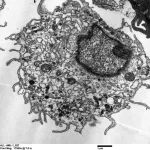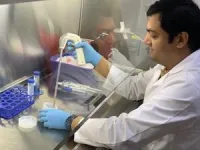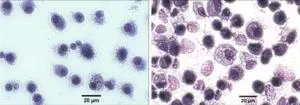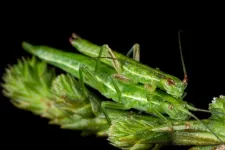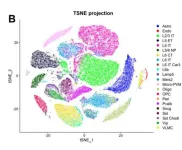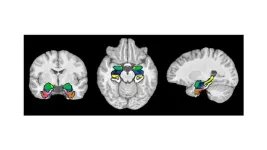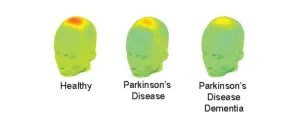(Press-News.org) SAN ANTONIO (June 12, 2023) — Researchers at Texas Biomedical Research Institute have succeeded in generating the lung’s most important immune cell, the alveolar macrophage, in the lab. The cell culture model will make it much easier and inexpensive for researchers around the world to investigate lung inflammatory diseases and test new potential therapies.
Macrophages are the “Pac-Man” of the immune system, eating up garbage throughout tissues in the body. Alveolar macrophages specifically live in the lining of lung’s air sacs where air exchange occurs, and are usually the first immune cells to encounter pathogens entering the deep lungs, such as SARS-CoV-2 or the bacteria that causes TB.
“It is critical to study tissue-specific cells to better understand mechanisms of health and disease, and to screen potential new therapies,” says Texas Biomed Professor Larry Schlesinger, MD, and senior author of the paper published in the journal mBio.
Old vs. new
Human alveolar macrophages have been challenging to study because they reside deep in the lungs and are hard to access. Typically, they are collected through time-consuming and expensive lung washes, which involve using a bronchoscope to move through the throat and into the airways to collect fluid samples.
This new model starts with a simple blood draw. White blood cells are isolated and placed in Teflon jars with specialized cell culture components. Surfactant is added along with three different cytokine proteins, which are usually found in the alveolar lining fluid.
“We call it the magic cocktail,” says Susanta Pahari, PhD, a postdoctoral researcher at Texas Biomed and first author of the paper. “We are mimicking the alveolar environment in cell culture. It makes the cells think they are in the lungs.”
Within six days, the cells differentiate, or transform, into alveolar macrophage-like cells. The generated cells are 94% genetically similar to human alveolar macrophages collected from lung washes. The Texas Biomed team confirmed the model can be used to investigate TB and COVID-19; the cells readily take up the pathogens.
“It is very rewarding to develop something that can help the research community,” says Dr. Pahari. “We’ve already received numerous emails across the globe requesting macrophage development protocols. We are now looking into developing a kit that we can provide to make it even easier for others to replicate what we have done.”
Pivot & Improve
In a way, the advancement is a byproduct of the COVID-19 pandemic. When the pandemic hit, Dr. Pahari could not readily access human alveolar macrophages, and his research came to a grinding halt. So, he pivoted to focus on developing an alternative. It took years of trial and error to identify the most effective combination of components that go into the cocktail, as well as to conduct genetic testing and verification.
The model improves upon the standard approach used to create human macrophages in the Dr. Schlesinger lab for many years.
“We’ve been using human monocyte-derived macrophages which themselves are an excellent model but they do not closely resemble the unique alveolar macrophages,” says Dr. Schlesinger.
Dr. Schlesinger notes that the approach that ultimately worked is reminiscent of the process to generate adult induced pluripotent stem cells, which place adult stem cells in a specific cocktail to help them revert to a state where they can then differentiate into totally new tissues.
“I am excited to see the full potential of the alveolar macrophage-like cells and if they can be integrated into next-generation lung organoids,” Dr. Schlesinger says.
Learn more about the technology.
###
About Texas BIomed
Texas Biomed is a nonprofit research institute dedicated to protecting the global community from infectious diseases. Through basic research, preclinical testing and innovative partnerships, we accelerate diagnostics, therapies and vaccines for the world’s deadliest pathogens. Our San Antonio campus hosts high containment laboratories and the Southwest National Primate Research Center. Our scientists collaborate with industry and researchers globally, and have helped deliver the first COVID-19 vaccine, the first Ebola treatment and first Hepatitis C therapy. For more information, go to TxBiomed.org.
END
Magic cocktail generates lung’s most critical immune cell in the lab
New cell culture model for human alveolar macrophages will help advance research into respiratory diseases, from COVID-19 and tuberculosis to asthma, cystic fibrosis and chronic obstructive pulmonary disease.
2023-06-12
ELSE PRESS RELEASES FROM THIS DATE:
Evolutionary fuel: Researchers study maintenance of an ancient chromosomal inversion
2023-06-12
LOGAN, UTAH, USA -- Genetic variation is the ultimate fuel for evolution, says Utah State University evolutionary geneticist Zachariah Gompert. But, over centuries, that fuel reservoir gets depleted in the course of natural selection and random genetic drift.
Whether, or how, genetic variation can persist over the long haul remains a big question for scientists. Gompert and colleagues from the University of Montpellier in France, the United Kingdom’s John Innes Centre, the National Autonomous University of México, Querétaro; ...
Jefferson Lab Virtual Series serves up science brain teasers
2023-06-12
NEWPORT NEWS, VA – Here’s a question for you… Is it possible to learn key science concepts in three minutes or less? The answer: We sure hope so. The U.S. Department of Energy’s Thomas Jefferson National Accelerator Facility is now offering a new playlist called “Here’s a Question” as part of its long-running Frostbite Theater video series. In the “Here’s a Question” videos, longtime Frostbite Theater hosts Steve Gagnon and Joanna Griffin help viewers understand the scientific concepts underlying iron oxidation, magnetism and thermodynamics - and many more!
The series is the newest featured playlist ...
Experiment in Brazil identifies flood-prone areas of cities
2023-06-12
Scientists affiliated with the National Space Research Institute (INPE) in Brazil have combined models that predict urban expansion and land-use changes with hydrodynamic models to create a methodology capable of supplying geographical information that identifies flood-prone areas of cities, especially those vulnerable to the impact of extremely heavy rainfall.
The groundbreaking study was based on data for São Caetano do Sul, a city in metropolitan São Paulo, but the methodology can be used by other cities to devise public policies and make ...
Updating cars as fast as a smart phone
2023-06-12
Cyber-physical systems, such as vehicles, trains, airplanes, smart homes, or production facilities, combine electronic and mechanical elements with software. Development of these systems is highly complex due to the large number of dependencies among the components. “When a car’s wire harness is modified, the diameter of the cable duct also has to be changed,” says Professor Ralf Reussner, Spokesman of the CRC at KIT. This must be agreed upon by electrical engineers, software engineers and mechanical engineers. ...
Excessive alcohol consumption may accelerate Alzheimer’s disease progression
2023-06-12
LA JOLLA, CA—Alcohol use disorder (AUD) quickens the pace of Alzheimer’s disease progression when paired with genetic susceptibility. Scripps Research and University of Bologna scientists reported in the journal eNeuro on June 12, 2023, that repeated alcohol intoxication is associated with changes to gene expression indicative of disease progression in the brains of mice that are genetically predisposed to Alzheimer’s. When repeatedly exposed to intoxicating amounts of alcohol, ...
A step toward safe and reliable autopilots for flying
2023-06-12
In the film “Top Gun: Maverick,” Maverick, played by Tom Cruise, is charged with training young pilots to complete a seemingly impossible mission — to fly their jets deep into a rocky canyon, staying so low to the ground they cannot be detected by radar, then rapidly climb out of the canyon at an extreme angle, avoiding the rock walls. Spoiler alert: With Maverick’s help, these human pilots accomplish their mission.
A machine, on the other hand, would struggle to complete the same pulse-pounding task. To an autonomous aircraft, for instance, the most straightforward path toward the target is in conflict with what the machine needs ...
Mass General Hospital researchers uncover why light-to-moderate drinking is tied to better heart health
2023-06-12
BOSTON – A new study led by investigators from Massachusetts General Hospital, a founding member of the Mass General Brigham healthcare system, offers an explanation for why light-to-moderate alcohol consumption may be associated with lower risk of heart disease. For the first time, researchers found that alcohol, in light to moderate quantities, was associated with long-term reductions in stress signaling in the brain. This impact on the brain’s stress systems appeared to significantly account for the reductions in cardiovascular events seen in light to moderate drinkers participating in the ...
NIH grant backs study focused on Alzheimer’s in women
2023-06-12
HOUSTON – (June 12, 2023) – Two-thirds of the people suffering from Alzheimer’s disease are women, yet most research has ignored differences between the sexes.
To help fill this gap, Rice University postdoctoral fellow Hannah Ballard will look at how Alzheimer’s risk, estrogen levels and menopausal status interact with memory-related brain function and behavioral outcomes in women age 35-80.
Supported by a three-year grant from the National Institutes of Health (NIH), Ballard’s research could help identify the physiological factors ...
Self-esteem of kids with short stature tied to social supports, not height
2023-06-12
Philadelphia, June 12, 2023—Challenging the assumption that short stature negatively impacts children and adolescents’ self-esteem, a new study by researchers at Children’s Hospital of Philadelphia (CHOP) has found that in otherwise healthy short youth, quality of life and self-esteem are associated with coping skills and how supported they feel and not the degree of their short stature. The findings were published in The Journal of Pediatrics.
“There is a notion among some parents and caregivers that short stature will negatively impact their children in terms of self-esteem and social adjustment, so they seek out growth hormone ...
Brain waves may predict cognitive impairment in Parkinson's disease
2023-06-12
A few minutes of data recorded from a single electrode placed on top of the head may be sufficient to predict thinking problems, including dementia, in patients with Parkinson’s disease (PD). The finding from a new University of Iowa study might help improve diagnosis of cognitive disability in PD and develop new biomarkers and targeted therapies for cognitive symptoms of the disease.
“Cognitive decline, including dementia, is a significant and underappreciated symptom of Parkinson’s disease. ...
LAST 30 PRESS RELEASES:
Eleven genetic variants affect gut microbiome
Study creates most precise map yet of agricultural emissions, charts path to reduce hotspots
When heat flows like water
Study confirms Arctic peatlands are expanding
KRICT develops microfluidic chip for one-step detection of PFAs and other pollutants
How much can an autonomous robotic arm feel like part of the body
Cell and gene therapy across 35 years
Rapid microwave method creates high performance carbon material for carbon dioxide capture
New fluorescent strategy could unlock the hidden life cycle of microplastics inside living organisms
HKUST develops novel calcium-ion battery technology enhancing energy storage efficiency and sustainability
High-risk pregnancy specialists present research on AI models that could predict pregnancy complications
Academic pressure linked to increased risk of depression risk in teens
Beyond the Fitbit: Why your next health tracker might be a button on your shirt
UCSB scientists bottle the sun with liquid battery
Lung cancer drug offers a surprising new treatment against ovarian cancer
When consent meets reality: How young men navigate intimacy
Siemens Healthineers and Mayo Clinic expand strategic collaboration to enhance patient care through advanced technology
Physicists develop new protocol for building photonic graph states
OHSU-led research initiative examines supervised psilocybin
New review identifies pathways for managing PFAS waste in semiconductor manufacturing
New research finds state-level abortion restrictions associated with increased maternal deaths
New study assesses potential dust control options for Great Salt Lake
Science policy education should start on campus
Look again! Those wrinkly rocks may actually be a fossilized microbial community
Exposure to intense wildfire smoke during pregnancy may be linked to increased likelihood of autism
Children with Crohn’s have distinct gut bacteria from kids with other digestive disorders
Genomics offers a faster path to restoring the American chestnut
Caught in the act: Astronomers watch a vanishing star turn into a black hole
Why elephant trunk whiskers are so good at sensing touch
A disappearing star quietly formed a black hole in the Andromeda Galaxy
[Press-News.org] Magic cocktail generates lung’s most critical immune cell in the labNew cell culture model for human alveolar macrophages will help advance research into respiratory diseases, from COVID-19 and tuberculosis to asthma, cystic fibrosis and chronic obstructive pulmonary disease.
